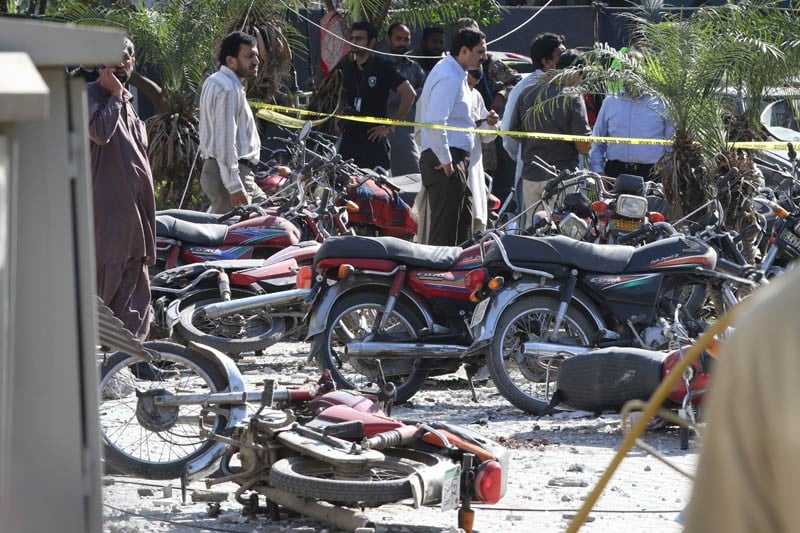
There is no other option now but to stick to hope and to translate it into action

In his book on the history of cancer, Sidharta Mukherjee gives a haunting description of metastatic cancer: a disease that disperses when attacked and becomes more dangerous over time. Imagine a ball of infection breaking up into smaller units and seeping deeper into the system. Each attack has a blowback effect. I cannot do justice to Mukherjee’s poetic writing or his knowledge of medicine -- I can merely relate, as a citizen of Pakistan, this description of metastatic cancer to the spread of terrorism in our homeland.
Tens of thousands of Pakistanis have perished in this war -- this sentence has nothing original to add but remains significant. The fact that we have buried tens of thousands of fellow citizens could not have been done only to surrender. Quite usually I am the voice of cynicism in my writings. I could sugar coat it and call it pragmatism but cynical my writings, more often than not, are. And I write this piece in the wake of two deadly bombings in Lahore -- and multiple bombings in Balochistan, KPK and Sindh.
As much as the cynic in me is tempted to say that things will get much worse, I am choosing to defy that instinct.
I am choosing to abandon despair, and instead choose to latch on to hope, because the enemies of Pakistan -- as a state and a polity -- think they can break the resilience so characteristic of my country and my people. Regardless of internal differences between Pakistan’s political parties, or even institutions, this is a fight that we are fighting for each one of us and for everyone around us. Our enemies know this. They know that Pakistanis are a people who will be their brother’s keeper.
Abbas Nasir of Dawn recently wrote something that has stayed with me. He described Jibran Nasir as saying that there are 200 million reasons for staying the course, for carrying on with hope. Every Pakistani is a reason -- whether that Pakistani is a child you dress up for school five days a week, a uniformed parent you kiss goodbye in the morning, a human rights activist, a civil servant or a labourer. These are all reasons to hope. Of course we can argue about how we got here, whether we did enough, whether we celebrated too soon. But when your home is burning, it makes little sense to argue over how the fire started. The point is to ensure our home survives -- along with the dreams surrounding it.
Yes, we have had misplaced priorities and we can argue immense errors of judgement in matters of governance and policy. But I do not understand how arguing over that will help us in the current state -- we have to decide that this latest blowback is the fight of our lives. And no sane individual I know in Pakistan, liberal or conservative, disagrees with this reading of events.
This is not the time to mock alleged security lapses or alleged shortcomings in risk management. This is the time to ask: how can we help? What can each one of us do to ensure that those blowing up our fellow citizens, soldiers, law enforcement personnel are made to pay for the grossest crimes against us as a people. As new policies are made, we unfortunately continue to talk at each other instead of talking to each other. It is an elementary communication strategy that you do not alienate your audience at the start of a speech: and yet different camps in Pakistan paint each other as incompetent, insincere or, worse, disingenuous. Such an approach towards discourse will only aid our enemies.
The mutual distrust between different sections of Pakistan’s governors and its people feeds into this. One way around this is to constantly remind each other that each one of us is acting in ways that we think are the best solution to the problems confronting us. If one starts with this belief, then a possible reaction to difference of opinion is not personal attacks but reasoned and nuanced conversations -- these will need to be conversations that applaud efforts made while also stressing through persuasion the suggested remedial measures. Internal discord and mistrust must be cured and kept at bay.
To give a very basic example: we need to think like parents who are fighting for the well-being of their children against life threatening infections. Us fighting with each other would be a great disservice to the common cause. We all need each other right now.
I choose to hope because every day I see multiple stories of Pakistanis carrying on with their lives, their resolve to love, to provide for sick, destitute and needy despite intimidating personal problems. In the resolve of Pakistan’s politicians, its uniformed personnel who stand guard at every vulnerable target, in the steadfastness of those who bury fallen colleagues and carry on, in the determination of those fighting heavy odds each day, there lies a reason to stick together.
There is no other option now but to stick to hope and to translate it into action. We cannot wake up every day thinking that we are a broken people with a system that works against us. For we all know people who keep this system going and they can always use a helping hand. A hope that we will overcome these obstacles would be a start. This will not be easy and at times this may cause grief, even loss, but there is no one else to turn to now.
Those who want to kill us cannot be allowed to suck the vigour out of our lives. And we must play our part in the home stretch. There is no option now but to be on the winning side.